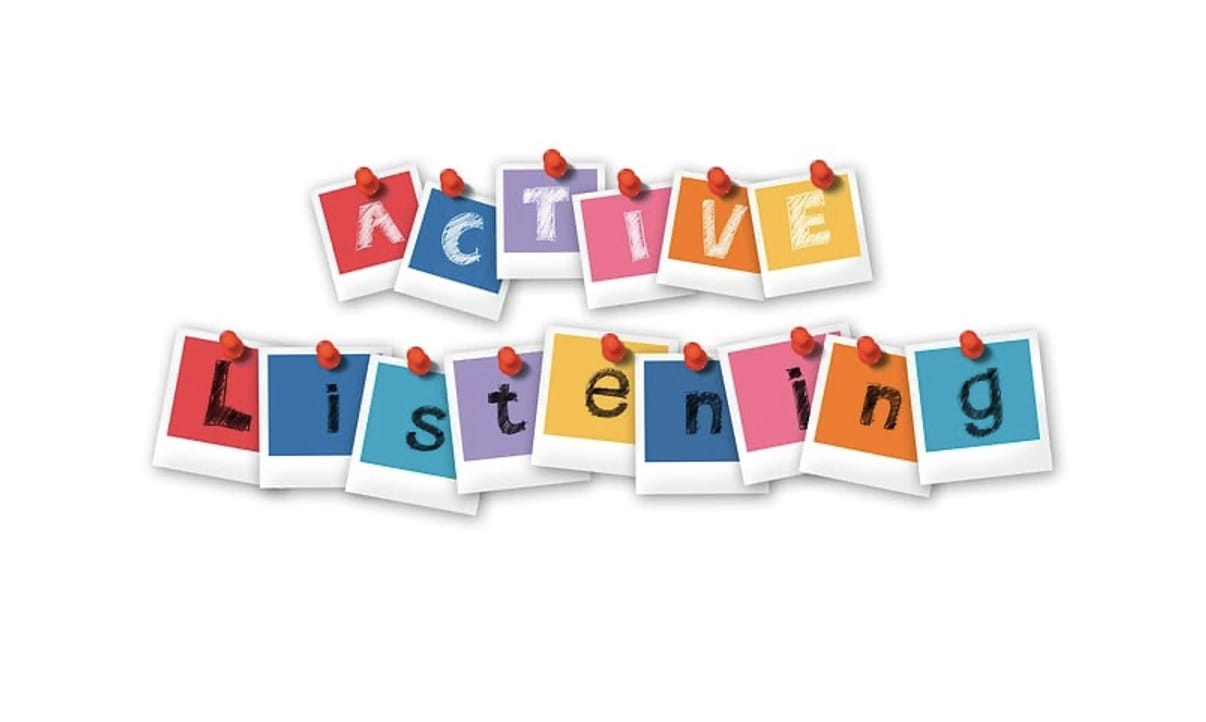Listening is the key to great communication, but what exactly is the origin of the word ‘communication’? To find out, read on.
We listen most of the time; breathing is the only thing we do more.
So most people take listening for granted but do they do it that well?
They may hear, but not listen and there’s a profound contrast between them.
Good listening makes all the difference in the ability to build honest, enduring
relationships while poor listening can do great damage if people half-listen or flatly refuse to listen. Bad listening is a key cause of misunderstandings and in turn misunderstandings cause conflict.
Listening blocks
 So with all the pressures and stresses of the day, how well do YOU listen to those who want your ear?
So with all the pressures and stresses of the day, how well do YOU listen to those who want your ear?
Listening blocks express themselves in thoughts which affect how you listen. The first step towards becoming a better listener & communicator is to recognize what gets in the way when you listen.
There are 101 reasons why people don’t listen; here are 10 commonly expressed obstacles:
- I don’t like the look of him/her
- I can tell s/he doesn’t like me
 S/he was so rude to me last week, I don’t see why I should listen to them
S/he was so rude to me last week, I don’t see why I should listen to them- What a ridiculous way of looking at things
- I’m not going to like this
- S/he never listens to me
- Get a move on, I’ve got a lot to do
- I’m completely lost; what are they on about?
- This has no relevance to me whatsoever
- I’ve heard it all before
Do you identify with any of these?
Most of us don’t listen at 100% all of the time; it would be totally draining. So we need to find ways to
- cut some of the negative parroting
- get down to the business of listening
- even if you dislike the speaker or feel bored by their style of delivery or expect you won’t like what they have to say.
Listening behaviours
Terrible listening: Quick Quiz
The second step is to be aware of your poor listening behaviours so you can put a stop to them. Here’s a quick quiz to identify a few poor listening practices.
 Do you multi-task (eg. e.g.. tap on your PC, read the paper or pour the coffee) when you’re supposed to be listening?
Do you multi-task (eg. e.g.. tap on your PC, read the paper or pour the coffee) when you’re supposed to be listening?- Do you drift into daydreams as the speaker gets going?
- Do you turn the conversation back to yourself?
- If the speaker is slow, do you dive in and finish their sentences for them?
- Do you judge, moralize, criticize and make remarks like “that was an odd thing to say?”
- If the speaker is unclear, do you lose patience and switch off?
- Do you tell people what they ‘should’ do, say or think and offer your “advice” even when they haven’t asked for it?
- What other poor practices are you aware of?
Terrific Listening: Quick Quiz
Here are eight great listening practices. Place a tick against all that you do. Keep doing them – they’ll serve you well.
- Can you listen without constantly interrupting?
- Do you concentrate on the speaker’s needs and feelings rather than turning the conversation back to yourself?
- Do you occasionally summarise what is said to check you’ve understood?
- Do you give encouragement to the speaker through your body language, responding appropriately by smiling, nodding and giving good eye contact?
- Can you say politely if you don’t understand and seek clarification?
- Do you ask appropriate, open questions like “what happened next?”, “How will you handle x and y?’ to find out more & encourage them to resolve difficulties themselves.
- Can you hear someone out, even when you disagree?
- Can you avoid moralising, being judgemental or offering advice, unless your advice is specifically called for?
Plan of action
If you answer these questions honestly you will be able to make your individual action plan to help you become a better listener.
- Quiz 1. Put an immediate stop to your worst listening habits. If you’ve got lots of bad habits, work on quitting 1 or 2 a week. Ask someone you trust to give you feedback on the changes you make.
- Quiz 2. Continue to practise all your great listening habits. Identify other habits you’d like to adopt and make a point of introducing them, one per week. Ask someone you trust to give you feedback on how you’re doing.
 What is communication?
What is communication?
We began by speaking of great communication. If you want to be a better communicator, have you thought about the origin and true meaning of the word? It stems from the Latin ‘communis’ which means shared understanding, the true value of truly listening.
If you are interested in exploring life coaching further, you are welcome to arrange a free initial call for 20 minutes without obligation. My combination of coaching and 121 training can add quality to your life personally and professionally and enable you to achieve your goals. It will be adapted to you as an individual and your unique circumstances.

 S/he was so rude to me last week, I don’t see why I should listen to them
S/he was so rude to me last week, I don’t see why I should listen to them Do you multi-task (eg. e.g.. tap on your PC, read the paper or pour the coffee) when you’re supposed to be listening?
Do you multi-task (eg. e.g.. tap on your PC, read the paper or pour the coffee) when you’re supposed to be listening? What is communication?
What is communication?